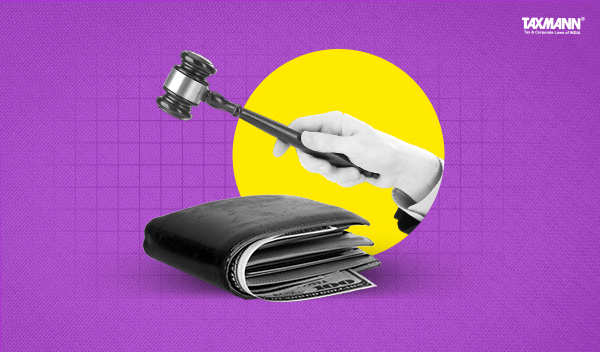[Opinion] Applicability of Section 87A in Cases Where Total Income Exceeds Rs. 7 Lakhs
- News|Blog|Income Tax|
- 3 Min Read
- By Taxmann
- |
- Last Updated on 3 September, 2024

CA V K Subramani – [2024] 165 taxmann.com 817 (Article)
The Finance (No.2) Act, 2024 when passed in the Lok Sabha there were a few changes and the prominent one was the extension of indexation benefit in respect of immovable properties acquired before 23rd July, 2024applicable only in the case of individual and HUF taxpayers (and not for others). Eagerly awaited clarification on section 87A applicability in respect of capital gain (covered under section 111A and section 112) and disallowance envisaged for payments to MSMEs vide section 43B(h) have gone unattended leaving the taxpayers in a fix. The lawmakers hold the primary responsibility to draft the legal provisions with reasonable clarity since the judiciary cannot interpret the law beyond its applicable domain and only in rarest of rare cases, a limited violence to the legal language is resorted to,for achieving the intended purpose that too when the provision per se leads to absurd results.
This refresher takes note of section 87A application as per the default regime contained in section 115BAC(1A)(ii) and the normal provisions.
1. Legal provision – Section 87A
Section 87A says that an assessee being an individual resident in India whose total income does not exceed Rs.5 lakhs shall be entitled to a deduction from the amount of income-tax before allowing deduction under this Chapter (i.e. Chapter VIII) on his total income with which he is chargeable for any assessment year, of an amount equal to 100% of such income-tax or the amount of Rs.12,500, whichever is less. This provision was solely applicable up to assessment year 2023-24.
For the assessment year 2024-25, the Finance Act, 2023 inserted a proviso to section 87A to provide tax relief when the taxpayers prefer default regime contained in section 115 BAC (1A), which reads as under:
“Provided that where the total income of the assessee is chargeable to tax under sub-section (1A) of section 115BAC, and the total income –
(a) does not exceed seven hundred thousand rupees, the assessee shall be entitled to a deduction, from the amount of income-tax (as computed before allowing for the deductions under this Chapter) on his total income with which he is chargeable for any assessment year, of an amount equal to one hundred percent of such income-tax or an amount of twenty-five thousand rupees, whichever is less;
(b) exceeds seven hundred thousand rupees and the income-tax payable on such total income exceeds the amount by which the total income is in excess of seven hundred thousand rupees, the assessee shall be entitled to a deduction from the amount of income-tax (as computed before allowing the deductions under this Chapter) on his total income, of an amount equal to the amount by which the income-tax payable on such total income is in excess of the amount by which the total income exceeds seven hundred thousand rupees.” [ Emphasis supplied]
For the assessment year 2024-25, section 87A per se (i) allows rebate of Rs.12,500 in the case of taxpayers whose total income does not exceed Rs.5 lakhs if have not opted for default regime contained in section 115BAC(1A)(ii); and (ii) in the case of taxpayers falling in default regime, the rebate is available to the extent of Rs.25,000.
Clause (b) of the proviso to section 87A provides for marginal relief if the total income exceeds Rs.7 lakhs and if the tax liability thereon is more than such excess income, it is enough that the taxpayer pays such excess income exceeding Rs.7 lakhs as income-tax. The marginal relief is available on decreasing in trend once the income exceeds Rs.7 lakhs and the relief reaches zero when the total income is Rs.7,27,778.
Click Here To Read The Full Article
Disclaimer: The content/information published on the website is only for general information of the user and shall not be construed as legal advice. While the Taxmann has exercised reasonable efforts to ensure the veracity of information/content published, Taxmann shall be under no liability in any manner whatsoever for incorrect information, if any.

Taxmann Publications has a dedicated in-house Research & Editorial Team. This team consists of a team of Chartered Accountants, Company Secretaries, and Lawyers. This team works under the guidance and supervision of editor-in-chief Mr Rakesh Bhargava.
The Research and Editorial Team is responsible for developing reliable and accurate content for the readers. The team follows the six-sigma approach to achieve the benchmark of zero error in its publications and research platforms. The team ensures that the following publication guidelines are thoroughly followed while developing the content:
- The statutory material is obtained only from the authorized and reliable sources
- All the latest developments in the judicial and legislative fields are covered
- Prepare the analytical write-ups on current, controversial, and important issues to help the readers to understand the concept and its implications
- Every content published by Taxmann is complete, accurate and lucid
- All evidence-based statements are supported with proper reference to Section, Circular No., Notification No. or citations
- The golden rules of grammar, style and consistency are thoroughly followed
- Font and size that’s easy to read and remain consistent across all imprint and digital publications are applied



 CA | CS | CMA
CA | CS | CMA
